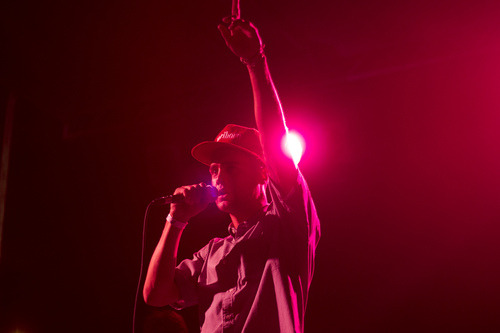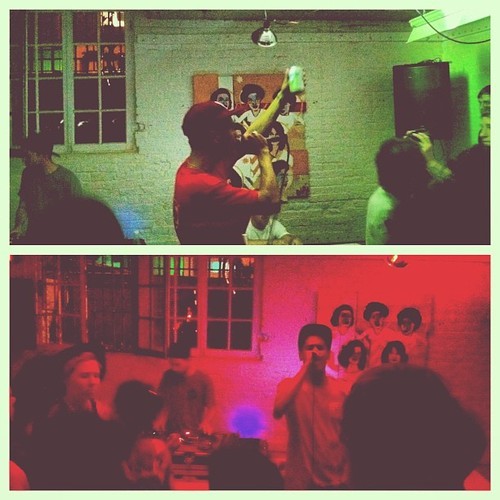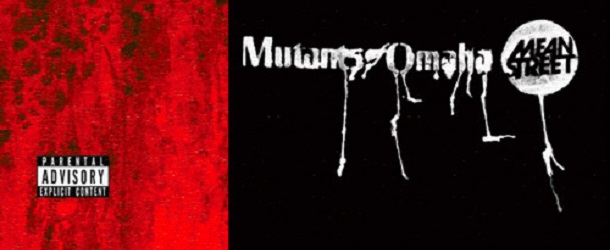By Jacob Zlomke
On a warm spring evening in April, two children ride bikes with training wheels along Gifford Park’s perimeter.
On Omaha’s 33rd Street, between California and Cass, there’s California Tacos and More, Marrakech Gourmet, Community Bike Shop and California Bar. Just around the corner, on California, sits Selena’s Market. Just south of Marrakech, the 102-year-old park, for which its neighborhood is named, stretches diagonally across five blocks.
On April 2, Cass Gas n Shop, across 33rd street from the park, was robbed with firearms. Over the last month, 26 crimes have been reported in the area, four of them violent. Across neighborhood averages in Omaha, the number is neither particularly high nor low.
Adam Haug, stage name Haunted Gauntlet, remembers when the Gas n Shop robbery occurred. Half a block from his house on Cass Street, he frequents the gas station nearly every day.
Haug, the producer for Omaha hip-hop group Mean Street — stylized M34N STR33T for the block between 33rd and 34th streets in the Gifford Park neighborhood where much of the group’s creation happens — doesn’t see Gifford Park’s criminal record as a the whole picture of the neighborhood, though.
Mean Street releases its debut album, Mutants of Omaha, at the Slowdown tomorrow night with Sean Pratt and the Sweats, Borealis and BOTH.
Haug doesn’t deny that Gifford Park has historically had its share of problems. Haug cites “Violent” by the Faint, whose frontman Todd Fink lives next door to Haug, from 2001’s Danse Macabre which partially details gun violence on the block. But to call it a violent or bad neighborhood would be to oversimplify.
“There’s a large demographic of people that are struggling financially and people that have huge houses a couple blocks away. You have every type of person. Every race, every age range, a lot of college kids, families. There is a lot of stuff happening right here and it’s mostly positive,” Haug says of Gifford Park. “It gets a bad rap for being a poor neighborhood. There’s been a history in this neighborhood of things happening that are maybe crime related.”
As authorities on Gifford Park go, the members of Mean Street are probably as reliable as they come. Haug says he’s lived in four different houses in the neighborhood over the last few years. He names a laundry list of friends and acquaintances who grace the surrounding blocks. Conchance, aka Brenton Gomez, the group’s rapper, lives just outside of Gifford Park, on the south side of Dodge Street, the neighborhood’s approximate southern border.
Mean Street wears Gifford Park, Midtown, Omaha on its collective sleeve and literally in its name, for all the neighborhood’s better and worse.
The final track on Mutants, “Scottie Pippen’s Right Kn33,” begins with a shoutout from Gomez, “It’s a beautiful day in Gifford Park,” over a sunny piano riff.
“This neighborhood,” Gomez says, “ten years ago, five years ago, it was fucked up. But things are getting a lot better.”
But without Gifford Park’s hiccups and imperfections, it wouldn’t be home to M34N STR33T. It wouldn’t be the Gifford Park that inhabits the background of Mutants of Omaha like a specter: noticeably present but hard to see.

courtesy photo
Take the Mean Street out of Gifford Park and into a different neighborhood, the suburbs out west or the slightly more developed Benson or downtown, for instance, and you get a group surrounded by, and so concerned with, different ideals. Take the Gifford Park out of Mean Street and you get an album with a less cohesive vision, lacking the psychological geographic glue that ties Mutants together.
Tracks on Mutants of Omaha find a base in Haunted Gauntlet’s production work, heavy on warped samples of forgotten pop songs from decades past. The result is indeed something haunted. On “$he God,” premiered here, a softly falling voice sweetly sings “every beat of my heart is just for you” over a boom-bap beat and ghastly windchimes. Conchance’s heartfelt delivery is echoed and remixed. In the last third of the song, all that tenderness explodes into something decidedly less soft-footed, like a spring breeze turned suddenly violent, crashing through an abandoned house’s window, blowing chiffon curtains persistently through the frame.
Gomez and Haug will be the first to admit the trio’s record, rounded out by Brian Crow, aka DJ Really Real, is not without its own faults.
Mutants, recorded in pieces over the last three and a half years in a score of houses and apartments around Gifford Park, was made almost entirely by Mean Street and whatever equipment they had available.
“It was rough, man,” Gomez says. “[Haug] didn’t have an interface for a long time, so we’d record and start catching these echoes and latencies every third take or so. You’d be recording and there would be like a half second delay, like, dude this shit is fucking with me.”
Haug says that, over the course of recording Mutants, he got better microphones, better gear, and so tracks that were cut earlier than others would have been recorded with lower quality equipment.
“We’re always 100 percent confident in the art we’re making, but being a startup DIY group, whatever means we had to get the track done, that’s what we went with.”
It’s possible that recording circumstances might have been different, more consistent, had the group’s circumstances been different, had there ever been a time where Gomez, Haug and Crow sat down and decided ‘Hey, let’s write and record an album.’ There was nothing so traditional to Mutants, though.
Instead, Haug started sharing beats with Gomez for his solo work as Conchance, where it would appear periodically in live sets. Eventually it led to a couple tracks that landed somewhere outside Conchance’s typical realm. Mean Street puts more focus on collaboration, it’s not Gomez rapping over beats by an assortment of producers. It’s a group of people honing a sound. Here, Conchance is a cog, not the sole arbiter.
They recorded those early tracks, and more kept coming.
Gomez says after rapping as Conchance for more than five years, he was ready for something fresh. The conceptual approach he and Haug had discussed for what would become Mean Street appealed to him for that reason. The two wanted to create something that, front-to-back, existed as a cohesive piece of art. For Mean Street, that means everything pumped out of the Mean Street machine, from music to visuals to design, works is given the same care.
The collection of collaborative tracks gave them a base on which to found those goals.
“It was just one-off tracks, and then they just kept stacking up,” Haug says. “You never know where to stop and eventually you have 19 tracks and it’s like, okay, it’s time to put out a record.”
Hence the three and a half year recording process. Hence cutting vocals in living rooms, basements, closets, bathrooms, wherever Haug had his laptop and a microphone.
“There was a period where I thought that maybe all these vocals need to be recut,” Gomez says. “But recording shit, and having it grimy, that adds texture. You can’t put a filter on for that kind of shit.”
“Having a super nice mic, that pristine quality, yeah, that would have been nice. But that’s not the record we made,” Haug says.
Mean Street’s relaxed attitude toward their recording circumstances belie grander ambitions for Mutants, though.
At the front of both Gomez and Haug’s minds is reaching an audience beyond Omaha.
“I want to get this record to a position where it can be examined and digested,” Gomez says. “It’s hard if you don’t have a label that can deliver your music to the masses. ‘I got this record right here.’ Yeah, well so do the rest of the mo-mos down the block.”
Partially in an attempt to find that greater reach, and partially as a way to push their own artistic limits, Gomez and Haug both talk about Mean Street’s visual element.
“We’re trying to do something different with our live show, theatrics, where it’s a show, not just some guy rapping at you. I like entering different worlds when you go to a show,” Gomez says.
They call video Mean Street’s next frontier, and the first installment in that direction might be the 8-bit internet-browser video game to be released with Mutants on Friday. But there are concerns, financial limitations. How many of their concepts can they feasibly accomplish on such a limited budget?
“Our goals are big, but the weaponry we have is small,” Gomez says.
In the 8-bit game, you play as Conchance, running through a recognizable side-scroller Midtown Omaha, down streets like Farnam, collecting slices of pizza and cans of Modelo while hopping on and over mutants who have overrun the town. The Woodmen Tower is visible in the background. It’s a silly game, a rudimentary version of arcade classics like Rampage. It plays simple enough, and it’s all soundtracked by Mutants. Haug’s friend and neighbor Jack Blanket designed the game.
With the album title, the video game, all the references to street names and shops and people, all the Omaha-hands on deck, even the group’s name, Mean Street intentionally puts themselves in a position to represent Omaha. Gomez says they were initially concerned that as Omaha-centric as Mutants is, it might fall on deaf ears to anyone outside the city.
“People from LA and New York, they rep East Los Angeles, Queens, whatever, and their records are up there,” he says. “That’s what we want to be, the patriots of our neighborhood. Pray to god we have the opportunity for more national notice, not only are we riding on that shit and getting fed off of that, but Omaha gets recognition and people like both. It’s a tilt of the hat to the city that without [it], we wouldn’t be making music.”
“You have to go to certain jungles to find certain animals,” Haug says. “You can only find Mean Street, or a voice like Conchance here.”
Gomez says Lenox Avenue comes to mind as well. He says he’s never been there, but songs that reference it don’t fail at letting him relate.
To him, relatability is rarely reached through a mutual understanding of specific references.

Gomez, who says he has done a lot of travelling, is inclination toward Omaha at least in part through pride, as well. He says when he goes to New York or Los Angeles or Mexico City, he’s proud to say he’s from Omaha. On his chest, he has a Midtown Marauders tattoo, a rap group with whom he used to perform and boasts Omaha performers like Black Jonny Quest.
“That is what I do. That is who I am.”
Within Omaha hip-hop, Mean Street might be part of a revival in a scene that Gomez says based on his personal experience, was stagnant for a very long time. He says he remembers growing up when Omaha had a vibrant and supportive hip-hop community, “before Atmosphere was making any real noise.”
“Over time music changes, whatever. Now it seems really segregated, some people are about their crew, that’s what they’ll stick to. I’ve done shows all over the city and people will be there to kind of do their show and be out. Their crowds are the same way,” Gomez says. “At the same time there are some artists now that are really promising. Both, out of North Omaha, that’s very promising to our community. Those dudes will be making waves and helping establish the community back to a set standard. We like to cross genres, but as much work as I’ve put into hip-hop, we want to be there with dudes like Both, Black Johnny Quest, Op2mus, all these rappers that are coming up. We want to make this shit powerful.”
Gomez also talks about racial segregation he’s seen at shows, where a crowd is made up primarily of white people or African Americans. He says so much of it depends on who’s on the bill.
“I don’t have to come in with this persona and this outfit on to tell this dude he’s a good rapper,” Gomez says. “Just because homie’s pants are way big or homie’s pants are way skinny doesn’t mean he’s not a good rapper. I think that’s what we’re going back to: ‘I like your music, you keep integrity to the art.’”
He talks about INFNTLP, one half of Both with Scky Rei, and Borealis. INFNTLP and one member from Borealis live within a few blocks of Haug, in Gifford Park. It’s their intention to build bridges across the Omaha music community. It’s why their album release show features hip-hop, metal, and indie-folk.
“We want people to feel uncomfortable, but feel good about it,” Gomez says.
In a way, then, Mean Street’s album release show is something of an analogy to Gifford Park — a melting pot, a community. Further, Mean Street, as a concept, relates more closely to the neighborhood than probably either Gomez or Haug ever considered. Mutants blends ‘50s pop samples with electronic hooks and Conchance’s articulate, intelligent rhymes, Gifford Park blends professions and demographics, gentrified apartment buildings and aging one-level houses.
The community of Gifford Park is, altogether, an uplifting and positive one. As Haug puts it, “there are little things that have happened that have scarred an otherwise very beautiful community.”
“One of the themes of the album is the positives and negatives of life, the polar opposites and the middle ground where they meet,” Haug says.
In the same way that the bumps in the Mutants road make the record as much as Conchance’s best turns of phrase, unfortunate occurrences in Gifford Park are as much a part of its identity as the community garden or the farmer’s market.
“The blemishes are the story of the record,” Gomez says.
Jacob Zlome is Hear Nebraska’s staff writer. Reach him at jacobz@hearnebraska.org.





